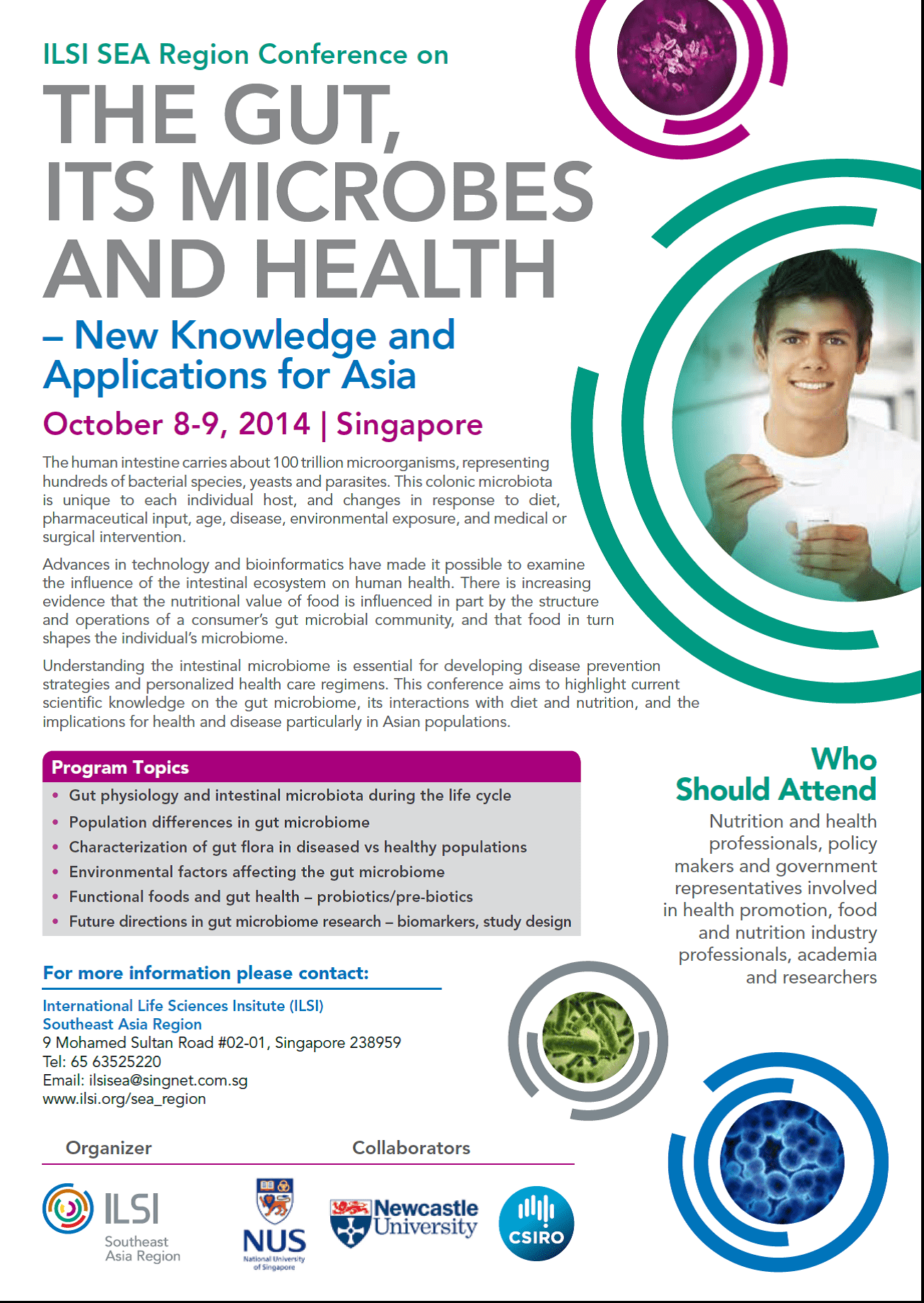Singapore, Singapore
08/10/2014 – 09/10/2014
Orchard Hotel
OVERVIEW
The human intestine carries about 100 trillion microorganisms, representing hundreds of bacterial species, yeasts and parasites. This colonic microbiota is unique to each individual host, and changes in response to diet, pharmaceutical input, age, disease, environmental exposure, and medical or surgical intervention. The microbiome refers to an "extended genome" of millions of microbial genes located in the intestine. Advances in technology and bioinformatics have made it possible to examine the influence of the intestinal ecosystem on human health. There is increasing evidence that the nutritional value of food is influenced in part by the structure and operations of a consumer's gut microbial community, and that food in turn shapes the individual's microbiome. Understanding the intestinal microbiome is essential for developing disease prevention strategies and personalized health care regimens.
OBJECTIVES
This two-day conference aimed to:
- Highlight current scientific knowledge on the gut microbiome, its interactions with diet and nutrition, and the implications for health and disease particularly in Asian populations
- Characterize the gut microbiome and its variation depending on genetic and environmental factors
- Present findings on the implications of the gut microbiome on health status during the lifecycle including effect on growth and development and longevity
- Provide an update on the role of the gut microbiome in certain disease states
- Highlight research on nutritional factors involved in maintaining stability of the gut microbiome
ORGANIZER
COLLABORATORS
Commonwealth Scientific and Industrial Research Organisation (CSIRO), National University of Singapore (NUS), Newcastle University International Singapore (NUIS), Indonesian Scientific Society for Probiotics and Prebiotics (ISSPP)
SPONSORS
Yakult (Singapore) Pte Ltd, BENEO GmbH and The Lee Foundation
PROGRAM
The program is available here.
- Plenary Session 1: The Intestinal Ecosystem and Core Microbiome
- Plenary Session 2: Gut Physiology and the Intestinal Microbiota Throughout the Life Cycle
- Plenary Session 3: Gut Microbiota in Health and Disease
- Plenary Session 4: Maintaining Gut Microbiome Stability
- Plenary Session 5: Environmental Influences on the Gut Microbiota
- Plenary Session 6: Foods for Gut Health – Regulatory Challenges
SUMMARY REPORT
The summary report is available here.
PRESENTATIONS
Plenary Session 1: The Intestinal Ecosystem and Core Microbiome
Basic Concepts: Gut Microbiota and Human Health (Presentation not available)
Prof. Liping Zhao, State Key Laboratory of Microbial Metabolism, School of Life Sciences and Biotechnology, Shanghai Jiao Tong University, Shanghai, China
Population Differences in Gut Microbiome in Relation to Diet, Environment and Human Gene
Prof. Yuan Kun Lee, National University of Singapore, Singapore
PDF
Plenary Session 2: Gut Physiology and Intestinal Microbiota throughout the Life Cycle
Colonic Physiology and the Gut Microflora
Dr. Iain Brownlee, Newcastle University, Singapore
PDF
Intestinal Microbiota during the Life Cycle
Prof. Patricia Conway, University of New South Wales, Australia
PDF
Plenary Session 3: Gut Microbiota in Health and Disease
Probiotics: A Double-edged Sword in Caries Prevention
Prof. Stephen Chin-Ying Hsu, Department of Preventive Dentistry, NUS, Singapore
PDF
Irritable Bowel Syndrome and Fecal Transplantation
Dr. Reuben Kong Min Wong, National University Hospital, Singapore
PDF
The Microbiome Influences Host Physiology in Early Life (Presentation not available)
Prof. Sven Pettersson, School of Biological Sciences and National Cancer Centre, Singapore & Microbiology & Tumor Biology Center, Karolinska Institute, Sweden
The Gut Microbiome of Undernourished Indian Children
Dr. G. Balakrish Nair, Center for Human Microbial Ecology, Translational Health Science and Technology Institute, India
PDF
Dietary Modulation of Gut Microbiota for Better Health (Presentation not available)
Prof. Liping Zhao, State Key Laboratory of Microbial Metabolism, School of Life Sciences and Biotechnology, Shanghai Jiao Tong University, Shanghai, China
Translating Gut Microbiome Structure to Function: Insights from Dietary Fibre
Dr. Trevor Lockett, Preventative Health National Research Flagship & CSIRO Animal, Food and Health Sciences, Australia
PDF
Plenary Session 4: Maintaining Gut Microbiome Stability
Prebiotics Fibre: an Asian Perspective
Prof. Robert Rastall, University of Reading, UK
PDF
Probiotics: Definition, Benefits, Selection, Formulation and ISAPP Consensus Paper (Presentation not available)
Prof. Seppo Salminen, University of Turku, Finland
Indigenous Probiotics and Immunological Effects
Dr. Ingrid Surono, Binus University, Indonesia
PDF
Towards Microbial Fermentation Metabolites as Biomarkers for Health Benefits of Prebiotics
Prof. Kristin Verbeke, KU Leuven, Belgium
PDF
Plenary Session 5: Environmental Influences on the Gut Microbiota
Antibiotic Resistance in Gut Microbiota
Dr. Sharmila Mande, TCS Innovation Labs, India
PDF
Gut Microbiota, Dietary Carcinogens and Colorectal Cancer
Prof. Hideki Ishikawa, Kyoto Prefectural University of Medicine, Osaka, Japan
PDF
Plenary Session 6: Foods for Gut Health – Regulatory Challenges
Challenges in Substantiation: What We Need to Know (Presentation not available)
Prof. Seppo Salminen, University of Turku, Finland
Regulatory Challenges in the Development of Probiotics as Foods
Ms. Yusra Egayanti, National Agency of Drug and Food Control, Indonesia
PDF
